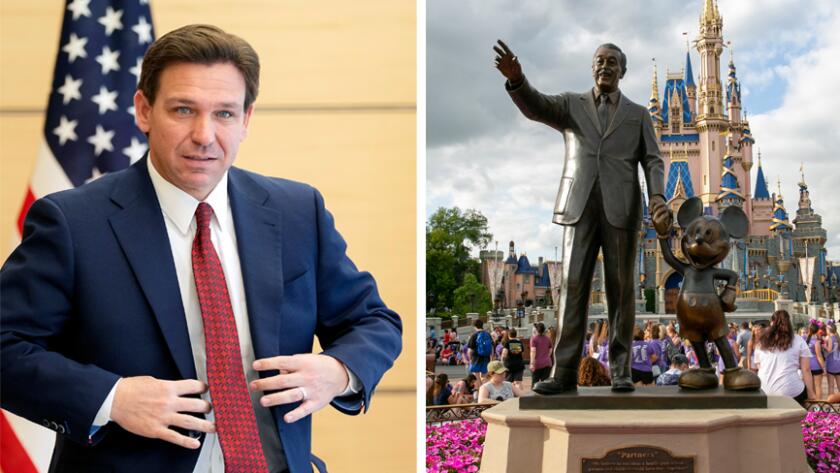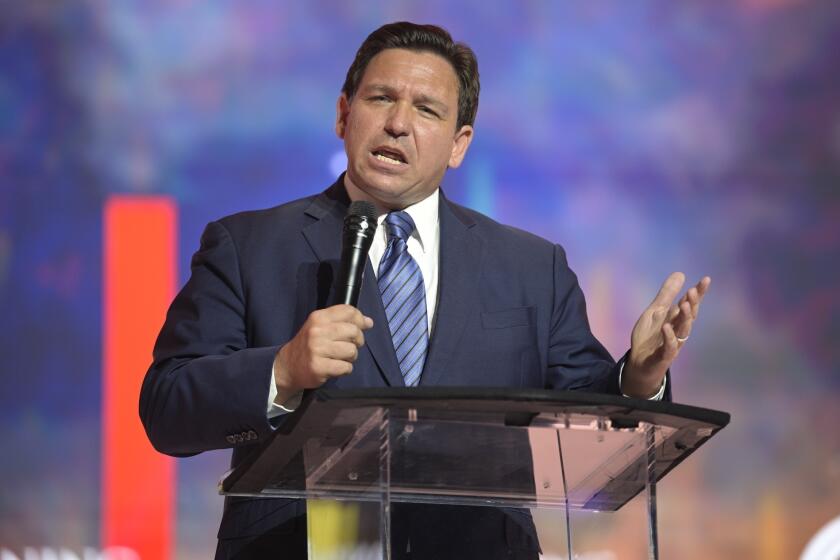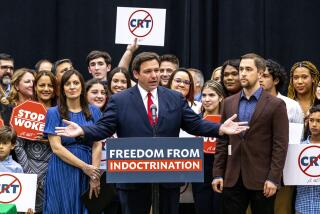Disney sues Ron DeSantis over Florida district: ‘A targeted campaign of government retaliation’
Disney and Florida Gov. Ron DeSantis have been battling over the company’s self-governing powers in the area of the state that includes Walt Disney World Resort.
Walt Disney Co. on Wednesday sued Florida Gov. Ron DeSantis in the latest salvo in a long-running fight over the company’s self-governing powers in the area of the state that encompasses Walt Disney World Resort.
“A targeted campaign of government retaliation — orchestrated at every step by Gov. DeSantis as punishment for Disney’s protected speech — now threatens Disney’s business operations, jeopardizes its economic future in the region, and violates its constitutional rights,” Disney said in a complaint filed in U.S. District Court for the Northern District of Florida.
The Republican governor — who is widely expected to run for president in 2024 — has made his battle against Disney a cornerstone of his culture wars campaign, at times referring to the legendary California company as a “woke Burbank corporation.”
The feud began last year after Disney spoke out against Florida’s so-called Don’t Say Gay legislation, which banned discussions on sexual orientation and gender identity in kindergarten through third grade. DeSantis has since pushed to expand the prohibition to all public school grades.
Disney, under pressure from employees, opposed the law, saying, “It could be used to unfairly target gay, lesbian, nonbinary and transgender kids and families.” The company said it would reassess its political contributions.
DeSantis lashed out, launching a year-long effort to strip Disney of its self-governing powers for its parks — sweeping privileges the company has enjoyed since 1967, when Florida officials were thrilled to let Disney turn miles of swampland into a bustling hub.
DeSantis signed legislation in late February that allowed the state to take control of the Disney-controlled Reedy Creek Improvement District and replace it with a tourism oversight board. He handpicked members for the new board — filling it with cultural conservatives and political allies — only to learn that the outgoing Reedy Creek supervisors had preemptively undercut the state’s power.
Reedy Creek officials in January adopted a new development deal giving Disney authority over its land use until at least 21 years after the death of the last surviving descendant of Britain’s King Charles III.
DeSantis and his allies were stunned and quickly moved to reverse those changes.
In the latest volley in the ongoing feud between Ron DeSantis and Walt Disney Co., the Florida governor suggested Monday that the state could assert control over land around Disney World.
Disney’s lawsuit sidesteps issues of land use and instead raises 1st Amendment concerns. The complaint, which seeks declaratory relief and an injunction, alleges that DeSantis has been waging a “relentless campaign to weaponize government power against Disney in retaliation for expressing a political viewpoint.”
Will Creeley, legal director for the nonpartisan Foundation for Individual Rights and Expression, said “the escalation of this dispute signals a troubling willingness by the governor to punish those who disagree with him.”
“This is the United States, the government is not supposed to abuse its power to punish dissenters or critics,” he said.
The lawsuit was filed in Tallahassee just minutes after the DeSantis-appointed oversight board voted to invalidate changes that the Disney-aligned Reedy Creek supervisors made in January. The company is seeking to preserve its ability to control the 43-square-mile region that includes Disney’s central Florida hotels and theme parks, including Magic Kingdom and Epcot.
DeSantis’ office slammed the action.
“We are unaware of any legal right that a company has to operate its own government or maintain special privileges not held by other businesses in the state,” the governor’s spokesperson, Taryn Fenske, said in a statement Wednesday. “This lawsuit is yet another unfortunate example of their hope to undermine the will of the Florida voters and operate outside the bounds of the law.”
Disney’s shareholder meeting comes amid Florida Gov. Ron DeSantis’ war on the Burbank company, which is seeking to put a bruising year in the rearview mirror.
Disney’s 74-page complaint echoed Chief Executive Bob Iger’s view that DeSantis’ efforts were retaliation for Disney exercising its free speech rights.
After Disney’s then-CEO Bob Chapek called DeSantis on March 9, 2022, to express the company’s concerns about the then-pending legislation, DeSantis reportedly told Chapek: “‘You shouldn’t get involved[;] it’s not going to work out well for you,’ ” the lawsuit said.
The following day, DeSantis’ reelection campaign staff sent an email accusing “Woke Disney” of “echoing Democrat propaganda.”
DeSantis announced the entertainment company had “crossed the line,” according to the lawsuit.
“We’re going to make sure we’re fighting back when people are threatening our parents and threatening our kids,” DeSantis said during a March 2022 news conference.
In another example Disney described as problematic: The Florida House member who introduced the Reedy Creek dissolution bill last year told his colleagues during a hearing: “You kick the hornet’s nest, things come up. ... This bill does target one company. It targets the Walt Disney Co.”
Disney also listed the benefits it has provided the Sunshine State during the last 50 years, including “establishing central Florida as a top global tourist destination and attracting tens of millions of visitors to the state each year.”
Disney noted that it was one of the region’s largest taxpayers — contributing more than $1.1 billion in state and local taxes last year — and among Florida’s biggest employers, with more than 75,000 employees.
Since the late 1960s, the Reedy Creek district has built 134 miles of roadways and 67 miles of waterways. And Disney said it plans to invest an additional $17 billion in Walt Disney World over the next decade, producing an estimated 13,000 new jobs.
Efforts during the last year to defuse the situation have gone nowhere, said Disney, which is represented by Los Angeles lawyer Daniel M. Petrocelli.
“The governor and his allies have made clear they do not care and will not stop,” the lawsuit states.
“The governor recently declared that his team would not only ‘void the development agreement’ — just as they did today — but also planned ‘to look at things like taxes on the hotels,’ ‘tolls on the roads,’ ‘developing some of the property that the district owns’ with ‘more amusement parks,’ and even putting a ‘state prison’ next to Walt Disney World,” the lawsuit said.
Board members picked by Florida Gov. Ron DeSantis to oversee the governance of Walt Disney World say their Disney-controlled predecessors pulled a fast one on them.
Disney is asking the judge to strike down the Florida legislation that took its land use powers away.
Harvard constitutional law professor Laurence Tribe accused DeSantis of “doubly violating” the 1st Amendment, first with the Don’t Say Gay legislation, and then again by threatening retaliation against Disney for opposing that bill.
The latter, Tribe said, “violates both the free speech clause and the freedom of petition clause of the 1st Amendment.”
The U.S. Supreme Court’s landmark 2010 Citizens United decision gave corporations and other outside groups the same 1st Amendment rights as people, allowing them to make unlimited campaign donations.
“Conservatives like it when a decision like Citizens United protects the free speech rights of corporations that try to influence our politics in a right-wing direction,” Tribe said, referencing the controversial ruling. “They can’t suddenly pretend that corporations don’t have free speech rights when they don’t like what the corporations are saying.”
And as for the possibility that DeSantis will argue that the steps he’s taken to push back on Disney are unrelated to the company’s speech?
“We can expect him to try,” Tribe said, “just like we can expect Mickey Mouse to fly.“
Creeley, the legal director, said the issue goes beyond a Republican governor taking on a corporate behemoth from a blue state.
He pointed to the U.S. Supreme Court’s interest in a National Rifle Assn. case, which argues that New York’s former Democratic governor and state finance official sought to punish companies, including insurance providers, that did business with the NRA.
“You can’t allow government officials — whether they are in blue states, red states or purple states, to say: ‘We’re gonna lean on this company or these critics because we don’t like their political views,’” Creeley said. “That should trouble every American no matter what their political beliefs.”
Times staff writer Ryan Faughnder contributed to this report.
More to Read
Inside the business of entertainment
The Wide Shot brings you news, analysis and insights on everything from streaming wars to production — and what it all means for the future.
You may occasionally receive promotional content from the Los Angeles Times.
















